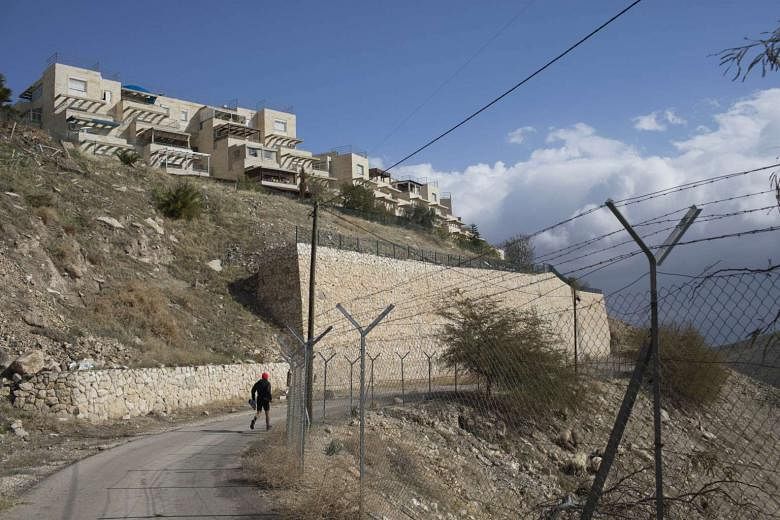JERUSALEM (AFP) - Israel's parliament has approved a bill legalising dozens of Jewish outposts in the occupied West Bank, despite a US call for restraint.
A vote would took place on Monday, although Prime Minister Benjamin Netanyahu reportedly said the day before that he wanted to coordinate the matter with US President Donald Trump before it was finalised.
However, such doubts were lifted when the premier told reporters accompanying him to London on Monday that the vote would go ahead after he had coordinated with the Trump administration.
Netanyahu had pledged to finalise the bill last week, but it was delayed over technicalities.
If adopted, the proposal would effectively legalise the "theft" of more than 800 hectares of land that even Israeli law has accepted as Palestinian, critics say.
It is seen as another step towards at least partial annexation of the West Bank, a key demand for parts of Netanyahu's right-wing cabinet, including the hardline Jewish Home party.
Although passed, the bill could still be challenged. Defence Minister Avigdor Lieberman said last week: "The chance that it will be struck down by the Supreme Court is 100 per cent."
Its defenders argue the bill will allow settlers to live without fear of being driven from their homes - many of which they have lived in for years.
They accuse Israel's justice system of being controlled by left-wing anti-settlement groups.
Last week, the few hundred residents of the Amona outpost in the West Bank were evicted after the Supreme Court ruled their homes were built on private Palestinian land.
International law considers all settlements to be illegal, but Israel distinguishes between those it sanctions and those it does not, dubbed outposts.
The lengthy saga around Amona - including the evictions broadcast live on Israeli television - directly inspired the bill.
Demolitions and removal of the buildings began on Monday.
The law would allow Israel to legally seize Palestinian private land on which Israelis built without knowing it was private property or because the state allowed them to do so.
Palestinian owners would be compensated financially or with other land.
The bill would "legalise" 53 other outposts, making them permanent and potentially allowing them to expand, according to the anti-settlement organisation Peace Now.
More than 3,800 homes would be "legalised", the NGO said.
UN envoy for the Middle East peace process Nickolay Mladenov said on Monday he was "concerned" by the bill as it would "enable the continued use of privately owned Palestinian land for Israeli settlements".
"If adopted into law, it will have far-reaching legal consequences for Israel and greatly diminish the prospects for Arab-Israeli peace," he added.
Israel will be looking to Trump's reaction, however, as the new US president has indicated he is far less hostile to settlement expansion than his predecessor Barack Obama.
Since Trump's inauguration, Israel has announced more than 6,000 new homes in the West Bank and east Jerusalem, seen as key parts of any future Palestinian state.
For the first time last week his administration said settlement expansion "may not be helpful" for peace prospects, but also broke with previous administrations by saying settlements were not an obstacle to peace.
The White House statement was interpreted as a message to Netanyahu and his government that the US administration intended to reserve its options.
Netanyahu had on Sunday tried to delay the review of the bill, while coordinating with Trump ahead of their Feb 15 meeting, Israeli media reported.
But Jewish Home was inflexible. Bezalel Smotrich, a Jewish Home MP, has threatened to withdraw support for the government if the vote does not go ahead.
Jewish Home has eight seats in parliament, with Netanyahu's government holding 66 of the 120 seats.
Attorney General Avichai Mandelblit has warned the government that the law could be unconstitutional and risks exposing Israel to international prosecution for war crimes.

